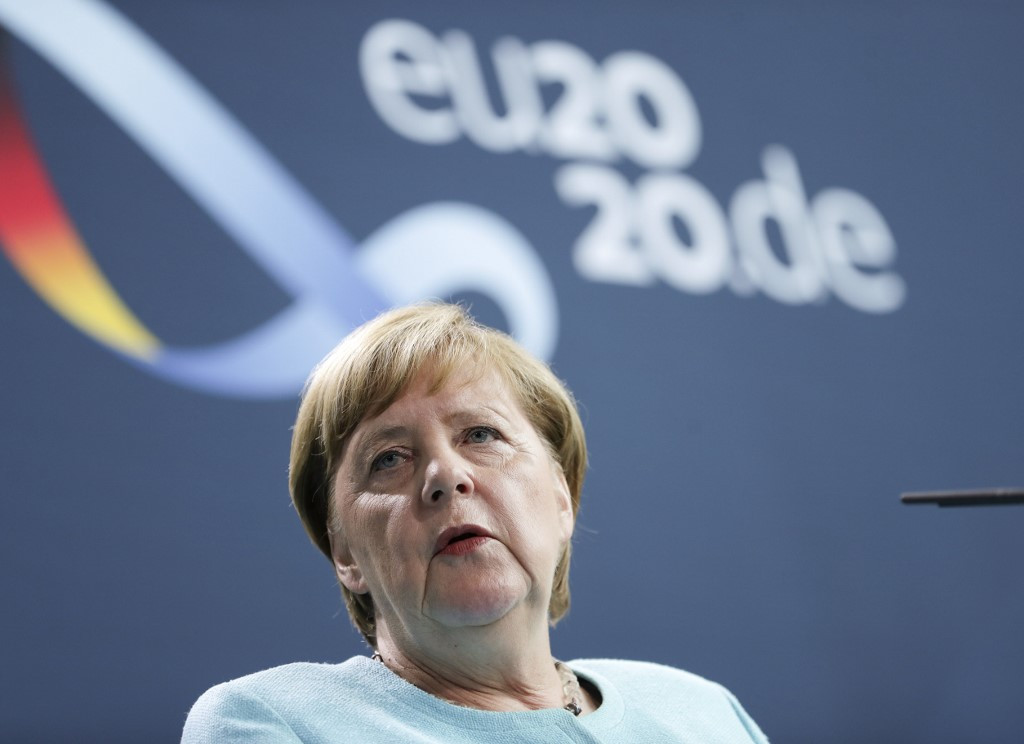Popular Reads
Top Results
Can't find what you're looking for?
View all search resultsPopular Reads
Top Results
Can't find what you're looking for?
View all search resultsBetting on rapid tests, Germany's Merkel seeks to ease virus curbs
Change text size
Gift Premium Articles
to Anyone
G
erman Chancellor Angela Merkel wants to start easing virus curbs from next week, a draft document showed Tuesday, as Europe's top economy bets on mass rapid testing and vaccines to ward off another Covid surge.
It comes as Merkel faces mounting political pressure to change course, with surveys suggesting Germans are losing patience and businesses are struggling to stay afloat after months of shutdowns.
"We're coming out of a long lockdown and must now proceed step by step," participants quoted Merkel as saying in a video call with MPs from her conservative bloc.
According to a draft text seen by AFP ahead of a crunch meeting with Germany's regional leaders on Wednesday, the veteran chancellor aims to loosen limits on socialising, by allowing up to five adults from two households to get together from March 8.
Under the current rules, one household may socialise with only one other person.
The text also says flower shops, book stores and garden centres should be next in line to reopen, after hairdressers were already allowed to open earlier this week.
However, most other shops and restaurants, as well as leisure, cultural and sporting facilities, should remain shut until March 28, according to the draft.
The premiers of Germany's 16 states have yet to agree to the proposals.
Despite concerns over the spread of more aggressive coronavirus mutations, the document says a gradual relaxation is warranted because of the upcoming ramp-up in vaccine deliveries and the arrival of mass rapid antigen tests.
"These two factors will clearly change the pandemic situation," it reads.
Free tests
Health Minister Jens Spahn has promised to offer all Germans free antigen tests soon at designated places like pharmacies, where results will come on the spot.
Germans will also soon be able to buy cheap DIY testing kits at drug stores.
From April, pupils and teachers back in school should be given at least one free test a week, according to Merkel's document, with companies also facing testing requirements.
The text stresses that existing hygiene precautions must remain in place and that restrictions can again be tightened should infection rates spike.
Germany closed bars, restaurants, gyms and cultural centres in November, before adding non-essential shops and schools in December as the country was badly hit by a second Covid-19 wave.
The measures helped bring down infection rates, allowing schools to partially reopen late last month.
But the daily number of new coronavirus cases has plateaued recently and even risen slightly on some days, prompting fears of a third wave.
Germany added nearly 4,000 new coronavirus cases on Tuesday, according to the Robert Koch Institute, bringing the total to more than 2.4 million since the start of the pandemic.
More than 70,000 people have died.
Merkel's draft document explicitly warns of the risks posed by more contagious virus variants such as the strain that first emerged in Britain and now accounts for a large share of new infections in Germany.
"The experiences of other countries show us how dangerous the different Covid-19 variants are. They make it clear that we have to be careful when restarting public life," the text says.
No Easter trips abroad
Looking to the Easter holidays in early April, the draft urges Germans not to go on domestic or international holidays. But rules on family visits will be less strict, it adds.
Merkel and state premiers agreed last month to hold back on reopenings until Germany's seven-day incidence rate fell below 35 new cases per 100,000 residents.
On Tuesday, that figure stood at 65.4 nationwide.
The draft document says rapid testing could "make further reopening steps possible" even with incidence rates above 35.
Bavarian premier Markus Soeder was among those cautioning against reopening too hastily.
Instead, he urged the federal government to relax the vaccination priority list.
Like other European Union countries, Germany has come under fire over its sluggish vaccine rollout.
The problem has been exacerbated by muddled public messaging about the AstraZeneca/Oxford jab, prompting some of those first in line to spurn the shot.
"Vaccinate anyone who wants it," Soeder has urged.










